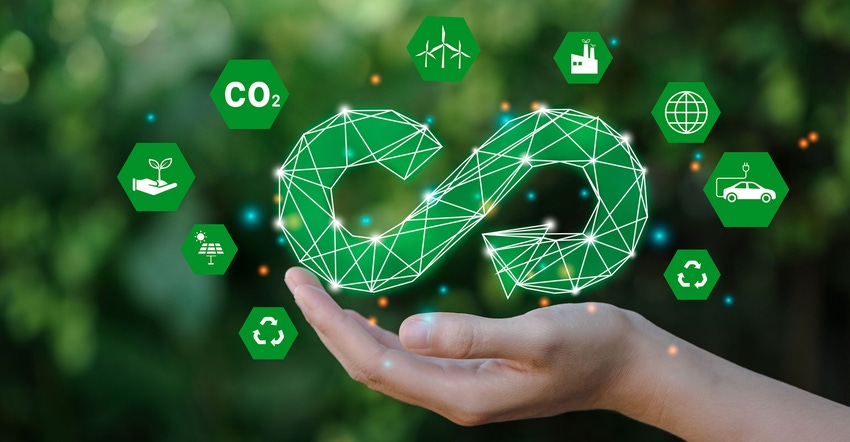November 29, 2022

BASF’s massive research and production facility in Ludwigshafen, Germany, covers nearly 4 square miles and is considered the world’s largest integrated chemical complex. From there, a wide range of products is developed and, in many cases, manufactured. But how that manufacturing occurs in the future is likely to change, with an eye toward a climate-smart approach for the business.
During a recent global media event, the company outlined its work to move toward biological approaches in making base chemicals.
“Our actions revolve around sustainability, and it’s the core of our strategy,” said Melanie Maas-Brunner, chief technology officer and a member of the board of executive directors at BASF. “Sustainability and innovation go hand in hand at BASF.”
The entire chemical industry faces rough seas. This energy-intensive business draws many of its raw materials from fossil fuels, and that must change as the world moves toward ambitious climate targets. At the same time, skyrocketing energy prices are putting pressure on costs, even as companies work toward the transition.
The European Union has a new approach to chemicals with a focus on sustainability, and “BASF is facing many challenges at once,” Maas-Brunner said. “Our production must become more climate neutral. We must create a circular economy, scrutinize many of our products and achieve the digital transformation — and all of this in the middle of an unprecedented energy crisis and the soaring inflation here in Europe.”
However, she also sees what she called “enormous opportunities” for a sustainable future, with BASF using innovation to transform.
Rethink chemical processes
Farmers know the BASF name for its wide-ranging crop protection products, and more of those are coming to market. But looking upstream at the processes used to make those products, Maas-Brunner said changes are coming.
The change starts with reevaluating the conventional chemical value chain. The chemical industry starts with molecules from basic raw materials, often fossil fuels. The first stage is to create small, simple molecules from energy-intensive feedstocks to produce increasingly complex products for customers.
“Today, recycling of our products is not widely used, and it’s mainly limited to mechanical recycling of plastic waste,” she says. “In this case, the structure of the polymers remains intact and cannot be used in our building block principle.”
Transforming the process by using renewable energy is critical to create climate-friendly chemistry. “However, one thing is clear, our raw material base will still contain carbon because our world and our products are based on carbon,” Maas-Brunner said. The key is to decarbonize energy inputs, leaning more on renewable sources rather than traditional fossil sources.
The new approach to chemicals, and likely crop protection products, will lean more on renewable energy, bio-based raw materials and climate-friendly raw materials. One process, which BASF has branded ChemCycling, would work to pull back raw materials into the chemical process.
Putting tech to work
ChemCycling’s process to bring material back into the process will take time to deploy widely, but Maas-Brunner shared news that researchers have developed a process that may reduce the carbon footprint for production and the electric vehicle industry.
BASF is a leader in cathode active materials for EV batteries with a solid market position in the industry. The company is now working to capitalize on that position with new technology.
“Our researchers have developed a process to recover the lithium, nickel, cobalt and manganese with really high yield from end-of-life lithium-ion batteries,” she said. “The metals we recover via battery recycling will be used to produce new cathode materials. This is really a circular model and will support our customers through the value chain.”
That technology reduces the carbon footprint of EVs and works to meet stricter requirements for future battery use. Maas-Brunner said the company is working to transition the tech from the lab to a factory to optimize the technology with a prototype plant on the Ludwigshafen site.
The chemical industry is looking at the “circular” approach in all its processes, with an aim to pull back and reuse basic chemicals to make new products. The cathode-recycling breakthrough is just one approach Maas-Brunner detailed during her talk.
Future stories will detail two areas the company is working on — the concept of “white biotechnology” and a partnership for a new biobased technology that turns waste gas into basic chemical building blocks without using fossil fuels.
The chemical industry, including crop protection, will see changes upstream that are more climate-friendly downstream. It’s a positive story for any industry relying on chemicals for the future.
About the Author(s)
You May Also Like






